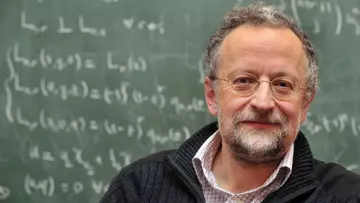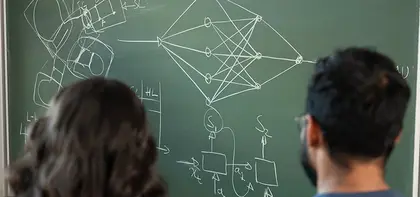
Emeritus Group
Geometry and Complex Systems
The emeritus group of Jürgen Jost is an interdisciplinary research team that on one hand carries out research in pure mathematics and on the other hand explores new approaches to complex systems in a wide range of domains, bringing in the spectrum of mathematical concepts and methods in novel ways.
/
Staff
Katharina Matschke
Assistant to Prof. Jost & Scientific Coordinator
/
Research
Scientific Goals
- Translate the action functionals, the concepts and the computational tools of High Energy Theoretical Physics into mathematical structures. This is both fertile and challenging because of the inherent symmetries and invariances.
- Clarify the fundamental biological concepts and develop the conceptual and mathematical tools for systems biology. How can we integrate detailed studies of individual pathways, coarse-grained network analysis, and modern mathematical data analysis techniques?
- Develop an economic theory that does not depend on the notion of a fully rational representative agent and that does not reduce itself to equilibrium analysis, but that rather focuses on the dynamics of expectations of boundedly rational and heterogeneous individuals. How is information generated and processed in human societies?
- Humans with their limited abilities are often more clever and innovative than theory allows them to be. In particular, they often find creative and unexpected, but efficient shortcuts for solving complicated problems. How to formalize that and translate it into powerful structural heuristics in data analysis and machine learning?
- What is the right relation between theory and data driven approaches? Can we transform mathematics from a tool of science, investigating particular structures emerging from other fields, into a science of tools, proposing which structures to look for and how to do that?
- What are the neuronal dynamics and the rules of thinking, and how are these embodied in the brain, that make the formation of complex concepts like coherent objects with interdependent features possible?
- What is common to the complex systems of biology, cognition and society, and what is specific to each of them? What are the appropriate concepts?
- Formalize and operationalize the concepts and notions of the humanities and social sciences and connect them with the tools of data analysis and machine learning. To what extent can a global, data driven approach (distant reading) complement the traditional study of particular details (close reading)?
News
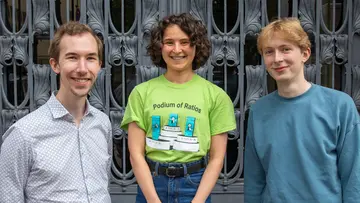
PhD Life
30.05.25
Meet Our New PhD Representatives Meet Our New PhD Representatives
We are proud to introduce the newly elected PhD representatives at our Institute. Congratulations to Nicolas Weiss, Nat Kendal-Freedman, and Felix Lotter!

PhD Life
22.04.25
Building Bridges Between Mathematics and the Life Sciences Building Bridges Between Mathematics and the Life Sciences
We congratulate Giulio Zucal on successfully defending his PhD thesis, in which he presents cutting-edge tools to explore the structure and underlying geometry of networks. Now a postdoctoral fellow in the ELBE program, he continues to investigate the connection between mathematics and the life sciences.
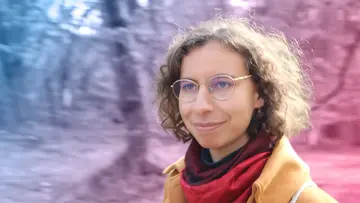
PhD Life
29.10.24
Exploring Metaphors and Shaping Social Transformation Exploring Metaphors and Shaping Social Transformation
We congratulate Marie Teich on successfully completing her PhD in Digital Humanities. Marie has recently started teaching at the American University in Kyiv. She is also actively involved in a research group initiative that helps shape social and cultural transformations. We wish Marie all the very best!
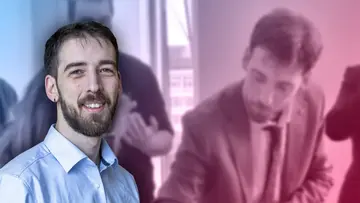
PhD Life
16.05.24
Congratulations to Fabio Di Nocera Congratulations to Fabio Di Nocera
Fabio Di Nocera successfully defended his dissertation, in which he explores a formalism for creating a unified framework that allows the description of both, classical and quantum information geometry, together. Congratulations and our best wishes for the future.
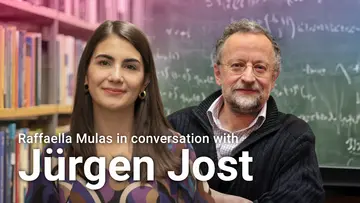
In Conversation
15.12.23
Raffaella Mulas in Conversation With Jürgen Jost Raffaella Mulas in Conversation With Jürgen Jost
Raffaella Mulas, former group leader at MPI MiS, interviewed Director Jürgen Jost. Explore Jost's journey in mathematics and beyond, and learn about the mysterious Erdős-Bacon number in their lighthearted conversation.
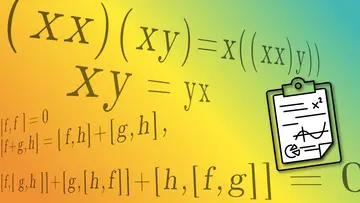
Research Briefs
28.09.23
What Lie Algebras Can Tell Us About Jordan Algebras What Lie Algebras Can Tell Us About Jordan Algebras
Our latest Research Brief from the group of Jürgen Jost explores links between algebra and geometry. They discuss connections between Jordan algebras and Lie groups and investigate symmetries in algebraic structures.

Press Releases
08.09.23
What Do Neurons, Fireflies and Dancing the Nutbush Have in Common? What Do Neurons, Fireflies and Dancing the Nutbush Have in Common?
Synchronicity is all around us, but it is poorly understood. Jürgen Jost, Joseph Lizier, and colleagues have now developed new tools to understand how human and natural networks fall in and out of sync.
Members
Staff
Katharina Matschke
Assistant to Prof. Jost & Scientific Coordinator
Group Leader
Eckehard Olbrich
Computational Social Science / Postdoc Contact
Affiliated Member
Hans-Bert Rademacher
Affiliated Member
Matthias Schwarz
Publications
Preprint
2025Separation of time scales in weakly interacting diffusions
inJournal
2025The isochronal phase of stochastic PDE and integral equations : metastability and other properties
In: Journal of differential equationsinJournal
2025Pathway realizability in chemical networks
In: Journal of computational biologyinJournal
2025Directed transit functions
In: Results in mathematicsinJournal
2025Stochastic partial differential equations arising in self-organized criticality
In: The annals of applied probabilityinJournal
2025Biased processing and opinion polarization : experimental refinement of argument communication theory in the context of the energy debate
In: Sociological methods and researchPreprint
2025Efficient compression of neural networks and datasets
Preprint
2025Merging hazy sets with m-schemes : a geometric approach to data visualization
Preprint
2025China's rise in the chemical space and the decline of US influence
inJournal
2025Corrigendum to: 'Transit functions and pyramid-like binary clustering systems' [In: Discrete applied mathematics 357 (2024) 365-384]
In: Discrete applied mathematicsinJournal
2025A coadjoint orbit-like construction for Jordan superalgebras
In: Journal of geometry and physicsinJournal
2025